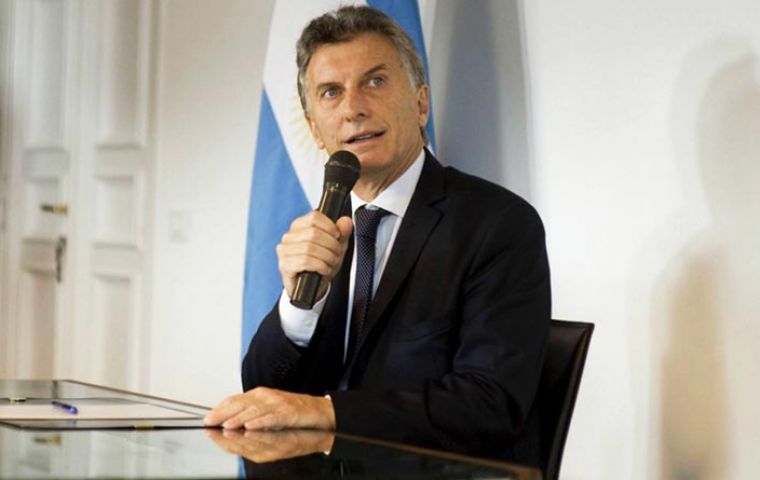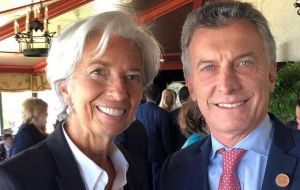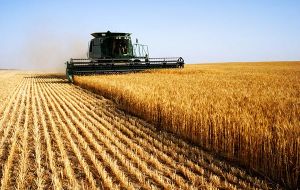MercoPress. South Atlantic News Agency
“Argentina on the rocky road to recession”, anticipates The Economist
 Frustratingly for president Macri, Argentina’s travails are, in part, a consequence of his efforts to put the economy on a firmer footing.
Frustratingly for president Macri, Argentina’s travails are, in part, a consequence of his efforts to put the economy on a firmer footing.  The IMF credit line means most of Argentina’s external-financing requirements are covered until 2020
The IMF credit line means most of Argentina’s external-financing requirements are covered until 2020  The year started badly for Argentina when the worst drought in 50 years hit the harvest of maize and soy-beans, both important exports
The year started badly for Argentina when the worst drought in 50 years hit the harvest of maize and soy-beans, both important exports On a residential street corner in Buenos Aires, Van Koning Market sells imported beers to the city’s well-heeled. Since it opened in June last year costs have soared. The peso has plummeted, meaning wholesale prices have shot up. Inflation is running at 26%; the reduction of government subsidies means the monthly electricity bill has risen from 700 pesos to 4,000 pesos (US$ 142).
Already losing customers, Sergio Discenza, the manager, is reluctant to raise prices much. “In a normal country this would be a viable business,” he says. “But here everyone is struggling.”
The year started badly for Argentina when the worst drought in 50 years hit the harvest of maize and soy-beans, both important exports. In May a stronger dollar and higher US Treasury yields prompted international investors to flee risky assets. Most emerging-market currencies suffered, Argentina’s especially. Its twin fiscal and current-account deficits have seen the peso lose more than a third of its value this year, making it the world’s worst-performing currency. A recession, the fifth in a decade, appears inevitable.
In May the central bank hiked interest rates to 40% to prop up the peso. When that failed Mauricio Macri, the president, secured a US$ 50bn credit line from the IMF. The peso continued to fall. On June 14th the central-bank governor resigned, admitting he had lost the confidence of investors. Luis Caputo, a former Wall Street trader, was moved from the treasury to replace him. Mr Caputo has had a tough start: since his appointment the peso has slid by a further 4% and the Merval, Argentina’s benchmark stock index, by 8%.
Frustratingly for Mr. Macri, Argentina’s travails are, in part, a consequence of his efforts to put the economy on a firmer footing. When he took office in December 2015, inflation was running at 25%. He allowed the peso to float. It quickly fell by 29%. He also gave the central bank freedom to raise rates, which encouraged foreign investors to buy government bonds and supported the currency. It remained overvalued. That kept imports high and made it hard for exports to compete. The current-account deficit rose to more than 5% of GDP. Meanwhile the government raised large amounts of foreign-denominated debt to cover the fiscal deficit. When investors cooled on emerging markets, all that left Argentina painfully exposed.
The IMF credit line means most of Argentina’s external-financing requirements are covered until 2020. But it is tied to austerity measures, including cutting the budget deficit, which reached 3.9% in 2017, to 1.3% of GDP next year and to zero by 2020. The savings are supposed to come from postponing infrastructure projects, cutting subsidies and transfers to the provinces, and shrinking the federal payroll. But Mr Macri controls neither house of congress, and investors fret that austerity lacks support. If he were to lose the presidential election due in October 2019, the deal with the IMF might collapse.
The currency crisis has also stoked social unrest. Argentines have long regarded the peso’s strength against the dollar, which is widely used for savings and property transactions, as a yardstick for their country’s economic performance. On June 25th a general strike called by the General Confederation of Labour, the largest trade-union grouping, in protest at the government’s economic policies, brought the country to a standstill. According to Capital Economics, a consultancy, “further strikes could force President Macri into wage concessions, slowing progress in bringing down inflation and the budget deficit.”
The pressure on Mr Macri is unlikely to ease soon. Aggravating the rise in prices caused by the peso’s weakness, oil prices are on the way up. As pay packets stretch less far, consumption will suffer. Interest rates will have to remain high for some time, putting companies off investment. Most analysts expect Argentina to fall into recession in the third quarter.
A stronger harvest could mean a return to growth next year, says Irina Moroni of Fundación Capital, a consultancy in Buenos Aires. But interest-rate hikes elsewhere may yet hurt any future recovery: in America because it puts investors off emerging markets and in Brazil because of the impact on already-feeble growth in Argentina’s largest trading partner. In January the World Bank predicted 3% growth for Argentina’s economy in 2019; last month it cut that forecast to 1.8%.
Mr Macri was elected because Argentines, sick of populist economic policies, supported his plans for reform. Now many are wavering. A recent poll of Buenos Aires residents found almost half saying they had been happier under his populist predecessor, Cristina Fernández de Kirchner. “We would probably have sold more beer under the previous government,” says Mr Discenza, standing in his deserted shop. Until recently, political analysts felt confident that Mr Macri would win a second term. His hopes rest on convincing Argentines that their glasses are still half full.




Top Comments
Disclaimer & comment rules-

Read all commentsWithout a doubt, the economic Argentine crisis is fast approaching a dead end and opinion polls reflect the population's fears of what's to come, because beside a small group of corporations, banks and financial institutions, the majority will bear the full impact of the growing recession and an eventual default.
Jul 09th, 2018 - 09:56 pm -2For those old enough, this downward slope recalls 1975's “Rodrigazo,” the end of the last military dictatorship in the earlies 1980s, the hyperinflation and recession at the end of Alfonsin's presidency in 1989, that of Menem in 1999 or that of De la Rua in 2001.
The current downward spiral has been caused by the blind application of “free market” measures at the worst possible time -- by opening the country to imports competing with local manufacturers when the world is restricting trade, by reducing or eliminating export taxes on agricultural and mining products, or authorizing huge increases on energy bills while the population's income is being eroded by the day.
It has also been caused by reckless borrowing with the only goal of keeping the lights on while eliminating barriers to speculative capitals to come and go.
Basically, what the country has had since the end of 2015 is a group of people with a polished marketing strategy and huge personal ambitions but no plan on how to steer a complex ship as Argentina.
Commenting for this story is now closed.
If you have a Facebook account, become a fan and comment on our Facebook Page!